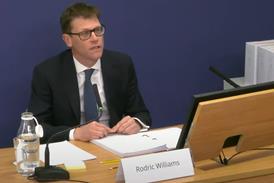Nearly two years after the government pledged to end the cross-examination of domestic violence victims by their alleged abusive ex-partners in the family courts, it has finally unveiled a draft bill to end the controversial practice.
The landmark bill, published today, will also introduce the first statutory definition of domestic abuse to specifically include economic abuse, as well as controlling and manipulative non-physical abuse.
The government says it decided to introduce a ban on cross-examination in the family courts following a unanimous response to its call for evidence and stakeholder events last year.
In criminal proceedings, the court can make an order preventing an unrepresented defendant cross-examining the alleged victim in person. In family proceedings, judges can use their general case management powers to prevent a victim from being cross-examined in person by the alleged perpetrator, but the family court currently cannot appoint a legal representative to represent the victim and conduct the cross-examination in their place.
Women's Aid, which last year published research revealing shocking attitudes of how family courts handle domestic abuse, said it was 'delighted' that the government has listened to its 'Child First' campaign and introduced a ban.
However, Katie Ghose, Women's Aid chief executive, said: 'Although this new law is much welcomed, it alone will not protect survivors in the family courts and challenge the "contact at all costs" approach by judges which is putting children in danger. We look forward to working with the government to introduce greater protections in the family courts for survivors, like special measures to safeguard them in the courtroom, and ensure that children’s safety is put at the heart of all decisions made by the family courts.'
Solicitor Cris McCurley, who represents domestic abuse victims, told the Gazette she was 'heartened' to see the cross-examination ban, which she described as 'probably the biggest win of the bill'.
According to an impact assessment published by the government today, it will cost approximately £8m a year to fund legal representatives to prevent victims being cross-examined by their alleged abuser. HM Courts & Tribunals Service will also face administrative costs.
However, McCurley, a partner at north-east firm Ben Hoare Bell and a member of the Law Society's access to justice committee, questioned how the government plans to fund the measure, pointing out that those who do this work tend to be legal aid practitioners and, in terms of funding, the justice system has been 'cut to the bone'.
The government says it is making 120 commitments to tackle domestic abuse, including £8m of Home Office funding to support chidren affected by domestic abuse and an additional £500,000 for provisions for male victims. McCurley said the justice system is 'absolutely at breaking point and a few bits of window dressing are not going to do the job'.

















![David Lester (senior partner at Blythe Liggins), Darryl Barnes, Jagdeep Sandher (head of dispute resolution at Blythe Liggins)[4]](https://d1d8vslyhr7rdg.cloudfront.net/Pictures/274x183/4/2/8/116428_davidlesterseniorpartneratblytheligginsdarrylbarnesjagdeepsandherheadofdisputeresolutionatblytheliggins4_981603_crop.jpg)






15 Readers' comments